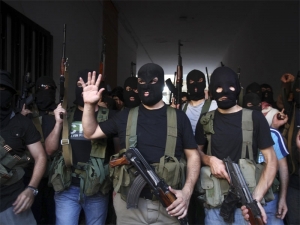 The logic of the Lebanese Meqdad clan was simple: One of the group’s fellow clansmen had been captured in Syria, and they were going to kidnap as many people as it took to barter for his freedom.
The logic of the Lebanese Meqdad clan was simple: One of the group’s fellow clansmen had been captured in Syria, and they were going to kidnap as many people as it took to barter for his freedom.
The detained clansman, Hassan Meqdad, was bloodied and bruised when he appeared in a video released by Syrian rebels on Aug. 13. Meqdad gunmen hit the streets two days later and grabbed at least 40 Syrian hostages, along with a Turkish businessman shortly after he landed at the Beirut airport.
The tit-for-tat kidnappings renewed fears that Lebanon could once again plunge into rounds of unchecked violence. They served as a grim reminder of the dark days of the Lebanese civil war in the 1980s, when thousands disappeared across the country.
As in the past, sectarian enmity seems to be driving the violence. The Meqdad clan is primarily made up of Shiites, and its captives are Sunni. Hassan, the hostage in Syria, is allegedly being held by the Free Syrian Army, a mostly Sunni group.
The sectarian divisions are reflected in the broader alignment of the region as governments and armed groups take sides in Syria’s civil war.
The Syrian government, which is run by members of an offshoot of Shiite Islam, is supported by Iran, the largest Shiite country in the region, as well as Hezbollah, the largest Shiite party in Lebanon. The Syrian rebels are supported by Saudi Arabia, Qatar and Turkey, all countries with a majority Sunni population. Analysts fear that the kidnappings could be among the first indications of a broader, regional war along sectarian lines.
Hassan isn’t the only Lebanese hostage in custody in Syria. In late May, 11 Lebanese pilgrims were kidnapped in Syria and are still being held. Last week, as the Meqdad clan embarked on its kidnapping spree, rumors spread that some of the 11 Lebanese pilgrims may have been killed in an attack in Syria. Enraged family members and supporters blocked the airport highway in Beirut with burning tires and debris.
After rounding up the Syrians this month, members of the Meqdad clan went on television wearing black balaclavas and toting AK-47s. They paraded some of their Syrian hostages, who were allegedly members of the rebel Free Syrian Army, in front of the cameras.
About half of those kidnapped by the Meqdad clan have reportedly been released. But there have been few signs of the Lebanese government or any security forces trying to intervene to free the others.
“It’s just a rampant culture of impunity — the state seeing itself as one actor among many rather than the enforcer of laws,” said Nadim Houry, the deputy Middle East director for Human Rights Watch.
While the government appears to exert little control over the clan, neither does one of its reported allies, Hezbollah. Hassan Nasrallah, the leader of Hezbollah, said in a speech last week that his group could no longer control the kidnappings and tire burnings in the streets of Beirut.
Clans in Lebanon have deep roots. During times of insecurity or conflict, the clan can act as family, benefactor and state, analysts say. Those ties only became stronger during the chaos of the Lebanese civil war, which ended in 1990.
Some clans have come into direct conflict with the Lebanese government. The Jaafar, a clan from the Bekaa Valley in eastern Lebanon, were blamed for an attack that killed four Lebanese army soldiers in 2009. They are believed to have attacked soldiers with rocket-
propelled grenades and machine guns this month.
The Meqdads originate from the area around Byblos in central Lebanon, according to clan members. They have since splintered, with Sunni and Christian branches in the north and Shiites, who make up the bulk of the clan, settling in the Bekaa Valley and in southern Beirut. The clan is believed to have up to 20,000 members.
Security forces blame the clan members for violence and weapons smuggling. Still, not all of the clan, which includes members who are doctors and lawyers, fit the stereotype. Since the mass kidnapping last week, Maher Mokdad, an urbane 53-year old with salt-and-pepper hair and a fondness for pressed khakis and pinstripe shirts, has emerged as a crisis manager and spokesman. (Mokdad uses a slightly different English spelling of his name than the one often used by his clan.)
On Thursday afternoon, Mokdad returned from a two-hour meeting with members of Lebanese General Security, who passed on an unambiguous message: Stop the kidnapping. He didn’t seem moved.
“Why do my people have to carry weapons?” he asked. “We have no government. We live in the jungle, and we have to survive. If the government cared for me, then I wouldn’t have to protect myself.”
Mokdad said the clan released 22 of the Syrian hostages who did not appear to have a link to the Syrian rebels. But the clan says it still has more than 20 Syrian hostages in custody, along with the Turkish businessman.
“If there’s a happy ending for Hassan [Meqdad], there will be a happy ending for them,” Mokdad said. “If there is a bad ending for Hassan, there will be a bad ending for them. All of them.”
Washington Post

Leave a Reply
You must be logged in to post a comment.